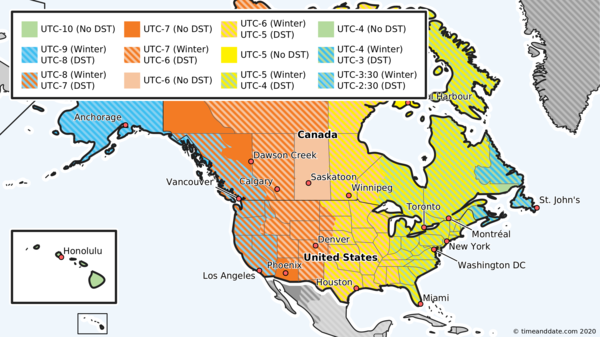Daylight Saving Time Ends in USA & Canada
In the United States, Canada, and Mexico's northern border cities, Daylight Saving Time (DST) ends on Sunday, November 7, 2021.


DST ends in the US and Canada on Sunday, November 7, 2021.
©timeanddate.com
Clocks will be set back 1 hour from 02:00 (2 am) to 01:00 (1 am) in each time zone.
DST in the US starts again on Sunday, March 13, 2022.
As always, Europe will end DST a week before the US, on October 31, 2021.
Affects Most of the US
On November 7, the time will change in almost all of the United States.
Only the following areas do not change their clocks:
- Hawaii and most of Arizona.
- The US dependencies American Samoa, Guam, Puerto Rico, the Northern Marina Islands, the US Minor Outlying Islands, and the US Virgin Islands.
Daylight Saving Time in the US
Canada: DST Change
In Canada, clocks will change in almost all areas, except:
- Yukon
- Most of Saskatchewan
- Some locations in Québec east of 63° west longitude (e.g., Blanc-Sablon)
- Southampton Island
- Some areas in British Columbia
Canadian clock change in detail
Up to US Congress to Change DST Law
According to the National Conference of State Legislatures, 19 states have enacted legislation or passed regulations for permanent DST.
Congress must first pass a federal law that would allow states to observe DST year-round. The current law only allows states to forgo DST, but no states have received congressional approval to permanently stay on DST year-round.
Legislation in 2021:
- In March, Mississippi enacted House Bill 1062, which would make DST the year-round standard time of the state.
- In April, the Governor signed Senate Bill 100 to keep Georgia on DST permanently.
- In May, Montana enacted Senate Bill 254 for year-round DST if Idaho, North Dakota, South Dakota, Utah, and Wyoming do the same.
- In May, the Governor signed Senate Bill 388 that would put Alabama on year-round DST.
- Minnesota has made an amendment to provide for “advanced standard time,” also known as DST, to be in effect year-round when approved by Congress.
Legislation in 2020:
- In February, the Utah Senate voted to approve Senate Bill 59. The bill would have Utah spring ahead and stay ahead permanently, but it requires action by at least four western states before taking effect.
- In February, the Governor of South Carolina signed Act No. 113 to put the state on year-round DST.
- In March, Georgia adopted House Resolution 1240, urging the federal government to allow states to switch to permanent DST.
- In March, the Idaho Governor signed Senate Bill 1267, making DST permanent in the state.
- In March, the Wyoming Governor signed House Bill 0044, which aims to establish DST as the official time year-round. It needs to be approved by voters at the next general election.
- In June, the Governor of Louisiana signed House Bill 132 to adopt Daylight Saving Time as the standard time.
Legislation in 2019:
- In December, the Governor of Delaware signed Senate Bill 73 to keep the state permanently on DST. The bill requires that Pennsylvania, New Jersey, and Maryland each do the same.
- In June, Maine enacted Legislative Document 885 that would keep the state on DST permanently.
- The Governor of Oregon signed Senate Bill 320 for permanent DST in June 2019. The state will only implement the law if Washington and California approve their all-year DST policies.
- In May, the Governor of Washington signed House Bill 1196 in favor of permanent DST.
- In May, Tennessee governor Bill Lee signed Senate Bill 1100, establishing DST as standard time.
- In December, Arkansas adopted House Resolution 1034, to allow the state to have permanent DST.
Legislation in 2018
- Florida's 2018 bill for permanent DST, dubbed the Sunshine Protection Act, is awaiting congressional approval.
- 60% of Californians voted in favor of permanent DST in Proposition 7.
Mexico: Northern Border Cities Follow the US
Some northern Mexican border towns, such as Tijuana and Juarez (Ciudad Juárez), end DST on November 7, with the US and Canada.
The rest of Mexico ends DST one week earlier on Sunday, October 31—on the same date as Europe's DST change.
The states of Sonora and Quintana Roo do not observe DST at all, so the clocks will not change there.
Other Countries and Territories
DST will also end on November 7 in Cuba, Bermuda, the Bahamas, Saint Pierre and Miquelon, and Thule Air Base in Greenland.
Upcoming DST changes worldwide
Set Clocks Back or Ahead?
One easy way to remember which way to set your clock is to keep in mind one of these sayings: “Spring forward, fall back” or “Spring ahead, fall behind.” The clocks spring ahead (= losing 1 hour) in the spring when DST starts, and they fall back one hour (= gaining 1 hour) when DST ends in the fall.